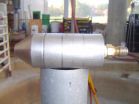New treatment for lung cancer shows promise
Non-invasive, inhalable powder increases survival rates
2010-11-16
(Press-News.org) Arlington, Va. — A new inhalable dry powder treatment for lung cancer shows a significant increase in survival rates and is far less invasive than current treatment options, which frequently include radiation and surgery. This research is being presented at the 2010 International Pharmaceutical Federation (FIP) Pharmaceutical Sciences World Congress (PSWC) in association with the American Association of Pharmaceutical Scientists (AAPS) Annual Meeting and Exposition in New Orleans, La., Nov. 14-18.
Lung cancer is the second most common type of cancer in the U.S., accounting for more deaths than breast, prostate and colon cancer combined, according to the Centers for Disease Control and Prevention. Many people endure more than one type of lung cancer treatment, which can last for weeks to months.
Lead researcher Raimar Löbenberg and his colleagues Warren Finlay and Wilson Roa from the University of Alberta developed an inhalable dry powder using a common chemotherapy drug encapsulated into nanoparticles. Some mice were treated with the inhalable powder and others with the same drug through two different delivery methods, a solution and IV injection of drug bound nanoparticles.
Results showed that the inhalable dry powder was more effective than using the IV or solution. In the study, more than 80 percent of the mice survived for more than 90 days and more than 70 percent survived for 140 days. None of the mice treated with the IV injection or solution survived past 50 days.
"Current lung cancer treatments can be grueling and take a significant toll on the patient," said Löbenberg. "Our results show that this treatment method may not only increase someone's survival rate but could also potentially be less toxic to the body."
The inhalable dry powder was also more effective than the IV injection in reducing the amount and size of tumors. Large tumor masses were seen in the lungs of those animals that were not treated or treated with the IV injection or solution. Animals treated with the inhalable dry powder showed fewer and much smaller tumors.
###
For the first time, FIP's PSWC and the AAPS Annual Meeting and Exposition will join to hold the world's largest pharmaceutical sciences meeting to improve global health through advances in pharmaceutical sciences. An estimated 10,000 scientists from more than 60 countries will participate in 100 sessions, including 40 symposia and roundtables.
Learn more about the meeting and global health from leading scientists in this webisode series and follow the tweet hashtag #PSWC2010 for meeting updates.
Editor's Note: All press must register and provide press credentials to attend this meeting. To register, please contact CatapanoJ@aaps.org or 703-248-4772. To schedule an interview with Raimar Löbenberg or any other press inquiry, please contact Hillarie Turner at hbt@ecius.net or 202-296-2002 x113.
About AAPS: The American Association of Pharmaceutical Scientists is a professional, scientific society of approximately 12,000 members employed in academia, industry, government and other research institutes worldwide. For more information, please visit www.aapspharmaceutica.com.
About FIP: The International Pharmaceutical Federation is the global federation of national associations representing two million pharmacists and pharmaceutical scientists from around the world. For more information, please visit www.fip.org.
ELSE PRESS RELEASES FROM THIS DATE:
2010-11-16
Researchers from North Carolina State University have developed a sensor that allows engineers to assess the scour potential of soils at various depths and on-site for the first time – a technology that will help evaluate the safety of civil infrastructure before and after storm events. Scour, or erosion of soil around structures due to water flow, is responsible for a wide range of critical infrastructure failures – from unstable bridges to the levees that gave way in the wake of Hurricane Katrina.
"The 'in situ scour evaluation probe' (ISEP) is the first technology ...
2010-11-16
Philadelphia, PA, 15 November 2010 - A family history of Alzheimer's disease significantly increases the risk for developing this disorder, but a new study in Biological Psychiatry suggests that which of your parents has the disease is very important.
Alzheimer's is the most common form of dementia in late-life, affecting over 5 million elderly in the United States alone. In order to develop preventative treatments, it is necessary to identify those individuals who are at highest risk for developing Alzheimer's.
Although individuals with a parental history of Alzheimer's ...
2010-11-16
Employees who telecommute the majority of the work week are more satisfied with their jobs compared to those working mostly in the office because working remotely alleviates more stress than it creates, according to a new study by a communication researcher at the University of Wisconsin-Milwaukee (UWM).
The study, conducted by Kathryn Fonner, UWM assistant professor of communication, and Michael Roloff, a professor of communication studies at Northwestern University, compared the advantages and disadvantages of each work arrangement. A paper outlining the results appears ...
2010-11-16
ANN ARBOR, Mich. — Men treated with hormone-based therapy for prostate cancer faced a 30 percent to 40 percent higher risk of colorectal cancer, compared to patients who did not receive this treatment, according to a new study.
The study looked at use of androgen deprivation therapy, a common type of treatment for prostate cancer that involves blocking the male hormone testosterone through either surgical removal of the testicles or a series of injections. It's been shown to benefit men with advanced cancers, but its benefit for less-advanced disease is unclear. Still, ...
2010-11-16
The world's first remote heart procedure, using a robotic arm alongside 3-D mapping, is due to take place at Glenfield Hospital in Leicester.
It comes six months after Dr Andre Ng carried out the first ever remote catheter ablation procedure using the Amigo Robotic Catheter System.
Dr Ng, is senior lecturer at the University of Leicester and consultant cardiologist and electrophysiologist at Glenfield Hospital.
On Tuesday 16 November, Dr Ng will be carrying out another "world first" using the robotic arm in combination with advanced 3-dimensional mapping to fix ...
2010-11-16
Emotional prosperity in Europe is falling, and this troubling fact needs to be faced by the European governments. That is the conclusion from a new research report from the University of Warwick which documents cross-country evidence on psychological health and mental well-being. The study, by Andrew Oswald, professor of behavioural science at Warwick Business School, draws together the latest statistical evidence from a range of social-science, science and medical journals. The study is to be published in the December issue of the British Journal of Industrial Relations. ...
2010-11-16
A pediatric immunologist at The Children's Hospital of Philadelphia collaborated with European gene therapy researchers who achieved marked clinical improvements in two young children with Wiskott-Aldrich syndrome, a very rare but often severe immunodeficiency disorder.
Jordan S. Orange, M.D., Ph.D., an expert in Wiskott-Aldrich syndrome (WAS), performed sophisticated cell imaging and analysis for the study, led by German researcher Christoph Klein, M.D., Ph.D., of Hannover Medical School. Orange was a senior co-author, and Children's Hospital was the only U.S. institution ...
2010-11-16
New evidence that homeopathic consultations can reduce the symptoms of rheumatoid arthritis has been revealed by scientists from the University of Southampton.
In a study published today in the journal Rheumatology, researchers found that arthritis patients significantly benefited when they received homeopathy alongside conventional treatment over a period of 6 months, but this improvement was due to homeopathy's consultation process and not its remedies.
"Although previous trials have shown homeopathy may help patients with rheumatoid arthritis, this is the first ...
2010-11-16
INDIANAPOLIS – A new national survey conducted by researchers from Indiana University and the Regenstrief Institute has found that while palliative care may be available for those with dementia, there are significant barriers to providing or receiving services to relieve the pain, eating difficulties and other symptoms associated with dementia.
The survey findings are reported in the Nov. 2010 issue of the Journal of the American Geriatrics Society.
"Although the general public and many physicians do not associate palliative or hospice care with dementia, dementia is ...
2010-11-16
Pinpointing the exact genetic cause of inherited deafness has always involved sequencing one gene at a time, a process that can take up to a year and cost roughly $1,000 per gene. It would cost around $75,000 to test all known deafness causing genes using this approach.
Now University of Iowa researchers working with colleagues at Baylor College of Medicine have developed a test that can screen all of the genes known to cause deafness in a single run, in one to three months and for about $2,000. It means quicker answers for families anxious to determine treatment options ...
LAST 30 PRESS RELEASES:
[Press-News.org] New treatment for lung cancer shows promise
Non-invasive, inhalable powder increases survival rates




